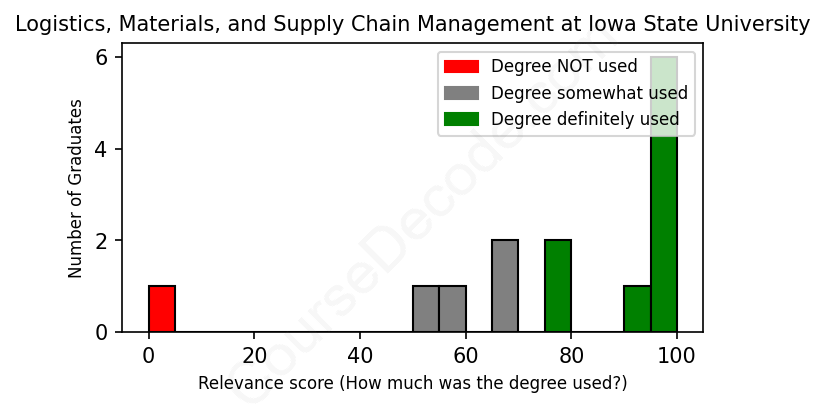
First, some facts. Of the Logistics, Materials, and Supply Chain Management graduates from Iowa State University we've analyzed , here's how many have used (or NOT used) their degree in their career:

These are estimates based on AI analysis of 14 LinkedIn profiles (see below).
The verdict? Above average. Overall, with an average relevance score of 77%, Logistics, Materials, and Supply Chain Management graduates from Iowa State University have a higher likelihood (+10%) of finding work in this field compared to the average graduate across all fields:
And for comparison, here's the chart for all profiles we've looked at across all degrees.
Also, after graduating, only 14% of these graduates have pursued further education other than another Bachelor's degree (such as a Masters degree or other), compared to the average across all profiles of 35%. This suggests a Bachelors degree is enough for most Logistics, Materials, and Supply Chain Management graduates, and it's normal to look for work straight after graduation.
See the details:
|
Relevance score: 77% We think this person has gone into a career highly relevant to their degree. We think this person has gone into a career highly relevant to their degree.
DEGREE INFOGraduated in 2019 from Iowa State University with a Bachelor of Science - BS in Logistics, Materials, and Supply Chain Management. Also pursued further education since (see below). JOB HISTORY SINCE GRADUATIONInventory Supervisor Buffalo Grove Park District May 2019 - Sep 2019 Phone Operator  Lou Malnati's Pizzeria Oct 2019 - Feb 2020 Store Associate  The UPS Store Jun 2020 - Jan 2021 Inventory Planning and Logistics Intern  LTD Commodities May 2021 - Aug 2021 Supply Chain Intern  Reynolds Consumer Products May 2022 - Nov 2022 Demand Planning Associate  Medline Industries, LP Jan 2023 - Present FURTHER DEGREES DONE SINCE GRADUATINGAssociate's degreeCollege of DuPage 2019 - 2020 Supply Chain Management Lewis University 2020 - 2022 ABOUTNo information provided. |
The top 10 most common jobs done by the graduates we've analyzed (ranked most common to least) are:
From the analysis of LinkedIn profiles of graduates from Iowa State University with a degree in Logistics, Materials, and Supply Chain Management, some common job roles emerge. Many graduates have taken up positions like Project Manager, Operations Manager, and various Purchasing roles. These positions are mostly centered around managing supply chain processes, procurement, and ensuring operational efficiencies, which are directly relevant to their educational background. For example, roles like Purchasing Manager and Operations Buyer show a clear application of logistics concepts, as they deal directly with procurement and supply chain strategies. Other titles like Transportation Analyst and Supply Chain Operations Associate also highlight a direct correlation between job responsibilities and the skills they learned during their studies.
However, not all job roles align closely with Logistics and Supply Chain Management principles. Some graduates have taken positions like Financial Analyst or roles in customer service, which lack direct relevance to their degree. Additionally, while some positions may utilize general business skills, they often don't leverage the specific logistics expertise gained through their education. Overall, it's a mixed bag: a significant portion of graduates find themselves in relevant logistics roles, while others seem to drift into areas that utilize more general business skills, leaving some of their specialized training underutilized.
Here is a visual representation of the most common words in job titles for Logistics, Materials, and Supply Chain Management graduates (this is across all Logistics, Materials, and Supply Chain Management graduates we've analyzed, not just those who went to Iowa State University):

Graduates from Iowa State University with a degree in Logistics, Materials, and Supply Chain Management generally seem to be doing quite well in their careers. Many of these individuals land jobs that are directly relevant to their major pretty soon after graduation. For example, several graduates took on roles like project managers, analysts, or buyers right out of college, often starting in internships that helped them transition into full-time positions. Over the next few years, there's a clear pattern of advancement, as many of them gradually move up to higher leadership roles within the same companies or related fields. The progression to senior roles—like operations manager, purchasing manager, or even vice president—shows that they are not only sticking to their industry but also climbing the corporate ladder successfully.
Looking further down the line, after about five or ten years, the majority of these graduates are holding significant positions, often with notable companies in the logistics and supply chain sector. There are instances of graduates becoming presidents or vice presidents at their companies, which indicates strong career growth. Even those who began with less traditional roles, like financial analyst or operations supervisor, have often transitioned into senior positions that align more closely with their degree. Overall, it seems that Iowa State graduates are leveraging their education well and finding fulfilling careers in the field of logistics and supply chain management, which is definitely a positive takeaway for anyone considering this path.
Honestly, a Bachelor’s degree in Logistics, Materials, and Supply Chain Management can be a mix of challenging and manageable, depending on your interests and strengths. At Iowa State University, you'll probably find that some of the core classes may require a good amount of analytical thinking, especially when dealing with topics like logistics modeling or inventory management. The workload can be pretty typical for a business program—so expect group projects, case studies, and some math, but nothing too crazy if you stay organized and engaged. If you enjoy problem-solving and have an interest in how goods flow and processes work, you might find it to be a fun experience rather than overwhelmingly hard. Overall, it's kind of on the easier side compared to some engineering or science degrees, but it still requires dedication and a willingness to learn!
Most commonly, in the LinkedIn profiles we've looked at, it takes people 4 years to finish a Bachelor degree in Logistics, Materials, and Supply Chain Management.
Alright, so looking at the job paths of these Iowa State University grads, it seems like they’ve generally been doing pretty well financially, especially considering their career progression. The 2011 grad went from Estimator to President at a construction company, which definitely suggests a solid salary boost over time. Others, like the 2014 grad at Collins Aerospace, climbed the ladder to Senior roles in less than a decade, which usually means good pay. Even the more recent grads are getting positions like "Manager" and "Director", which often come with decent paychecks, especially in logistics and supply chain. While some earlier roles might not have paid as much, the overall trend towards higher positions indicates they've likely made decent money in their careers. So, if you're considering a future in this field, it looks promising!
Here is a visual representation of the most common words seen in the "about" section of LinkedIn profiles who have a Bachelor degree in Logistics, Materials, and Supply Chain Management (this is across all Logistics, Materials, and Supply Chain Management graduates we've analyzed, not just those who went to Iowa State University). This may or may not be useful:

Here are all colleges offering a Bachelor degree in Logistics, Materials, and Supply Chain Management (ordered by the average relevance score of their Logistics, Materials, and Supply Chain Management graduates, best to worst) where we have analyzed at least 10 of their graduates:
| College | Score | Count |
|---|---|---|
 Michigan State University Michigan State University
|
84 | 23 |
 Auburn University Auburn University
|
83 | 19 |
 Ashford University Ashford University
|
82 | 12 |
 University of Wisconsin-Milwaukee University of Wisconsin-Milwaukee
|
81 | 10 |
 Rutgers Business School Rutgers Business School
|
79 | 24 |
 Penn State University Penn State University
|
78 | 21 |
 Embry-Riddle Aeronautical University Embry-Riddle Aeronautical University
|
78 | 10 |
 Arizona State University - W. P. Carey School of Business Arizona State University - W. P. Carey School of Business
|
78 | 14 |
 Iowa State University Iowa State University
|
77 | 14 |
 University of Houston University of Houston
|
76 | 30 |
 University of Arkansas University of Arkansas
|
76 | 18 |
 University of Tennessee, Knoxville University of Tennessee, Knoxville
|
75 | 15 |
 University of North Texas University of North Texas
|
69 | 14 |
 Texas A&M University Texas A&M University
|
67 | 27 |
 Georgia Southern University Georgia Southern University
|
62 | 13 |
 The Ohio State University The Ohio State University
|
60 | 10 |
 University of Houston-Downtown University of Houston-Downtown
|
57 | 13 |